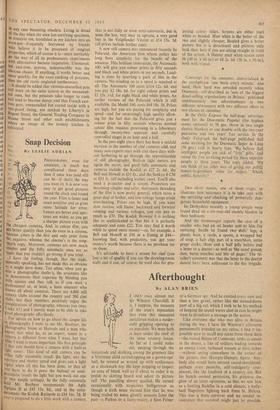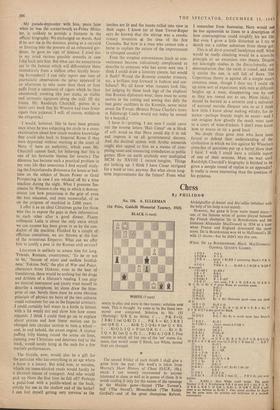Afterthought
By ALAN BRIEN
or a German spy. And he emitted every now and then a low growl, rather like the 'slowed-down purr of a big cat, which I took to be his method of keeping the sound waves alert in case he might want to broadcast a message to the nation.
Like everyone else who was alive in Britain during the war, I have Sir Winston's silhouette permanently branded on my retina. I find it im- possible now to recall any scene from those days —the ruined House of Commons, tanks at sunset in the desert, a line of soldiers wading towards an enemy coast, turbaned women at their lathes —without seeing somewhere in the corner of the picture that Humpty-Dumpty figure. Any- body else would have seemed round-shouldered, perhaps .even paunchy, self-indulgently com- placent, like the landlord of a country inn. But his hunch seemed protective, his pinkness the glow of an inner optimism, so that we saw him as a battling Buddha in a cold climate, a bully- beef Napoleon fighting back from St. Helena. This was a born survivor and we needed re- assurance that survival might just be possible.
My pseudo-encounter with him, years later when he was the corner-bench ex-Prime Minis- ter, is unlikely to provide a footnote in the official biography. We exchanged no words. And if he saw me in the distance, posing as a caryatid or freezing into the posture of an exhausted gar- dener, he gave no sign of interest. I tried out in my mind various possible remarks in case I did back into him. But what can the anonymous say to the famous which will differentiate them immediately from a million other loyally beam- ing bystanders? I can only report one item of journalistic observation—he never appeared in an afternoon to take more than three or four puffs from a succession of cigars which he then abandoned, smoking like joss sticks, as visible and aromatic signposts along the trail. (If my friend, Mr. Randolph Churchill, proves in a letter next week that Sir Winston had even fewer cigars than pyjamas, I will, of course, withdraw the allegation.)
I would, however, like to have been present once when he was subjecting his circle to a cross- examination about how much modern knowledge they could take back to Imperial Rome if they were deposited without warning at the court of Nero. (I have an authority, which even Mr. Churchill cannot fault, for believing that this is one of his favourite themes for reverie.) The dilemma has become such a practical problem in my own life that sometimes I find myself study- ing the Encyclopwdia Britannica for hours at bed- time on the subject of Steam Power or Gold Prospecting in case I am whisked off by a time machine during the night. What I presume fas- cinates Sir Winston is the way in which it demon- strates just how precarious is the grip of even the best educated, and most resourceful, of us on the progress of mankind in 2,000 years.
I offer it as an ideal Christmas game for those who like to expose the gaps in their information to each other after a good dinner. Fluent colloquial Latin is about the only extra which we can assume has been given to us by the con- ductor of the machine. Flanked by a couple of- officious centurions, we are thrown at the feet of the monstrous Emperor. What can we offer him to justify a post in the Roman civil service?
Literature is unlikely to amuse him for long. 'Friends, Romans, countrymen,' To be or not to be,' Season of mists and mellow fruitful- ness,' Eskimo Nell,' the plot of War and Peace, characters from Dickens; even in the best of translations, these would be nothing but the dregs and driblets of a lifetime's reading. I can play no musical instrument and barely trust myself to describe a saxophone, let alone draw the blue- print of one. Surely there must be some obvious principle of physics we heirs of the two cultures could rediscover for use in the Imperial armoury.
I could certainly boil water in a kettle (a helmet with a lid would do) and show him how steam expands. I think I could then go on to explain about pistons and how linear motion can be changed into circular motion to turn a wheel— and, lo and behold, the steam engine. A clumsy puffing billy hissing round the arena on lines, running over Christians and deserters tied to the track, would surely bring in the mob for a few matinee performances.
The bicycle, now, would also be a gift for the patrician who has everything in an age where a horse is a luxury. But solid iron, or wooden, wheels on stone-blocked roads would hardly be a pleasant means of transport. And who would pick up Nero the first time he fell off? Perhaps a pedal-boat with a paddle-wheel at the back, strictly for use in the shallow end of the baths?
I can feel myself getting very nervous as the
torches are lit and the beasts rolled into view in their cages. I know (or at least Trevor-Roper says he knows) that the stirrup was a revolu- tionary invention at the time of the first Crusades. But how is a man who cannot ride a horse to explain the nature of the improvement in stirruped cavalry?
Even the simplest conveniences (such as con- veniences) become ridiculously complicated to describe to someone who has never seen one. I think I could draw a lavatory cistern, but would it flush? Would the Romans consider trousers, say, a brilliant step forward in fashion and use- fulness? We all know what trousers look like, but judging by those back legs of the elephant that Russian diplomats wear, there must be some secrets in the cutting and sewing that defy the best gents' outfitters in the Kremlin, never mind about the Forum. (Bonnie Prince Charlie's trews in Edinburgh Castle would not today be owned by a beatnik.) I have it—printing. I am sure I could carve out the reverse letters 'Hail Cesar' on a block of soft wood so that Nero could dip it in ink and impress it on all governmental decrees. And the decimal system with Arabic numerals might also appeal to him as a means of com- puting taxes and measuring attendances at public games. How on earth anybody ever multiplied MCM by XXVIII I cannot imagine. Things are looking up. I think I have Cesar intrigued for a week or two, anyway. But what about long- term improvements for the future? From what
I remember from Suetonius, Nero would not be too squeamish to listen to a description of how contraceptives could simplify his sex life. But even I grow a little disturbed as I. try to sketch out a rubber substitute from sheep gut.
This is all do-it-yourself handyman stuff. What would be really clinching would be a scientific principle or an excursion into theory. Despite my late-night studies in the Encyclopcedia, my demonstration that the earth is round, and that it circles the sun, is still full of flaws. The Copernican theory is against all a simple man's common 'sense, though I dare say I could rig up some sort of experiment with men at different heights up a mast, disappearing one by one as they are rowed out to sea. More likely, I should be burned as a sorcerer and a subverter of national morale, Despair sets. in as I think how little 1 know about making whisky, for in- stance—perhaps brandy might be easier—and I can imagine how ghastly the result must taste to a court of wine-drinkers. I don't even know how to weave or itie a good knot.
No doubt those great men who have been forced to defend their understanding of the civilisation in which we live against Sir Winston's cross-fire of questions put up a better, show than
I have. 1 wish I could have a reliable report of one of their sessions. Must we wait until Randolph Churchill's biography is finished to be given a sample round of replies in an appendix? It really is more interesting than the question of his pyjamas.







































 Previous page
Previous page